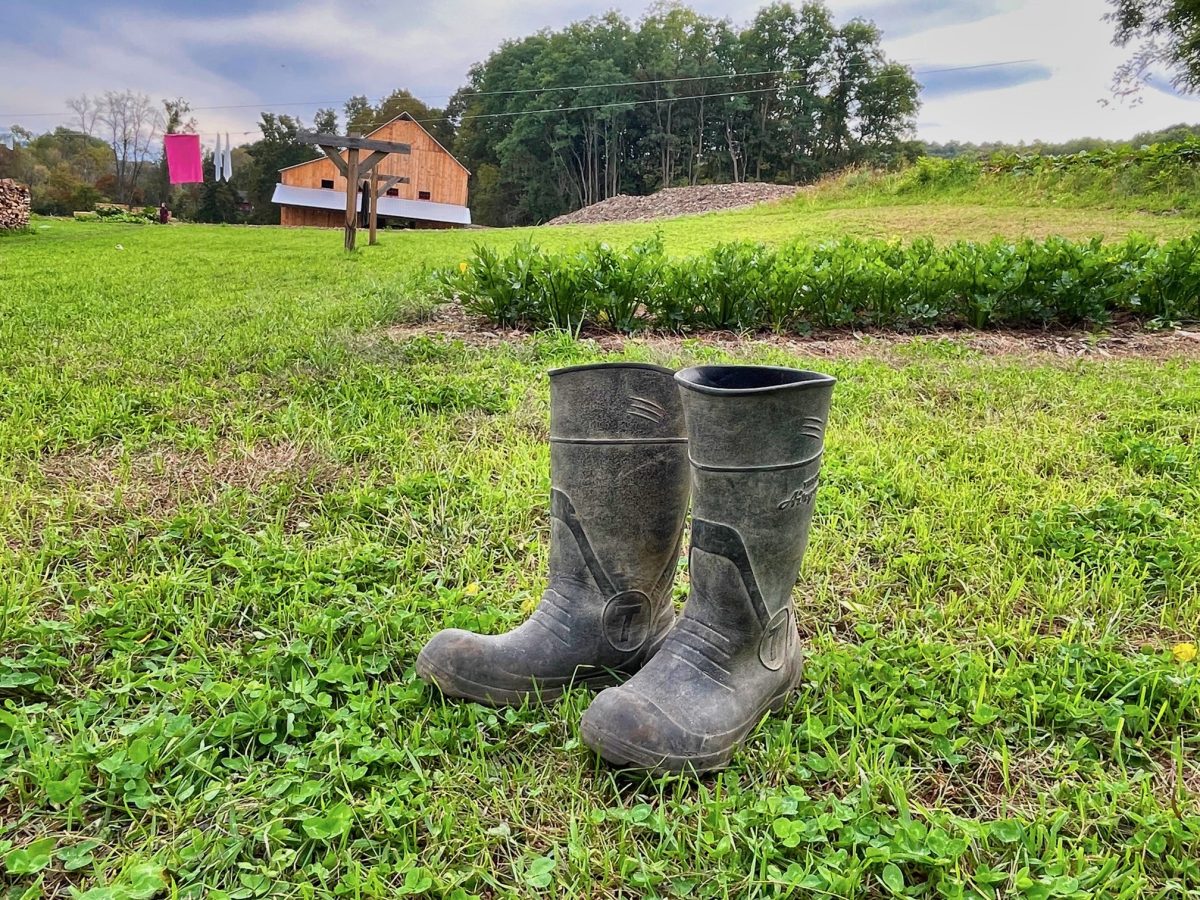I pulled up to the Miller Farm this morning to see if I could bring them ice cubes today or anything else, and I heard Moise’s shout from the house, “hey, Johnnie-Boy,” and he popped up at the door and waved for me to come in. He was sitting on his favorite chair by the stove, taking his boots off and changing his socks as he does many times a day.
It’s been a few weeks since we had the chance to talk. He is working every minute of every day but Sunday.
As he picked up his boots – he wears them every day of his life except for Sunday – I saw water dripping out of a hole in the side. If you saw what these boots go through plowing, hammering, climbing, digging, wading through rain and sun and concrete mix and mud and water and blistering heat, you would think it was an absolute miracle that they are intact; I have never seen boots take such a daily beating.
Moise loves these boots; he hugs them like puppies and laments that he bought them from a trader way up near the Canadian border and would love to get another pair one day. In the meantime, he lets them soak his feet and legs and won’t get new ones.
But he said there was nowhere to buy them around here, and he sounded resigned. His feet have to be unhappy about this arrangement.
I am learning how the Amish communicate what they want and need – or don’t. There is always a great emphasis on humility; it is okay, even preferred to suffer as Jesus did. They don’t go out and get things they want. Everything must be needed, considered, and plain.
The Amish never ask for anything and are discouraged from wanting things that are not essential or even things. I’ve never seen Moise buy one single thing for himself other than a hot dog or a piece of pizza.
The Amish grow or make 90 percent of what they need – like the rugged outdoor ankle boots he wears when he goes into town or is in for the night or traveling to Church. Amish shoemakers and milliners made and sold them, and every Amish man I’ve seen wears them. They make shoes for the women also.
The Amish never want charity and never ask for it or accept it. But there are times when they want some help, and they can’t directly ask for that either. They don’t want to take advantage of anyone. Navigating this is not simple. Doing without is Godly.
I am primarily a direct get-it-done kind of person. When I see those boots, I am only thinking one thing: My friend Moise needs new boots and would love a pair, as much as he uses them. There is no way he is wearing these boots through the winter as he builds his new home and is outside every minute.
Ice and snow and cold are on the way.
The Amish’s problem is not that they have no money; they have no easy way of finding the things they want and need.
By now, Moise knows I am a killer online; I take pride in finding almost anything. I always bring the bacon back.
I guess Moise is showing me his boots for a reason. It’s up to me to pick up the signal or not. ‘Moise,” I said, “you need new boots; you cannot go through a winter with these.”
He put his hat on and reached for his pipe, and put a new pair of sox and the boots back on. He never said yes or no. I stood up and asked to see the shoes and take a photo of the maker. I’d never heard of the manufacturer, but Moise said they were popular among the Amish, and I’m sure many workers have heard of them.
A lot of our communications are silent.
“Johnnie,” he asked, “do you think they sell these boots on the Internet?” That was the signal I needed and was waiting for.
I picked up the boots and went outside and took a picture of the manufacturer so I wouldn’t forget it.
I could tell this was a favored, rugged boot among hard-working people; they ranged in price from $22 to $80. Moise’s boot had the stamp: It was a Tingley Airgo boot. The company calls itself legendary, industrial rubber overshoes, the toughest in the industry.
Moise said the cost of his boot was $35, which meant he would be very reluctant to pay a dollar more, even some years later. God knows how much mud and pasture and concrete mix and manure these boots had seen.
We talked for a while, and he thanked me for the tool belt I bought him in August.
His thanks were, “that tool belt you bought me, Johnnie, works real fine.” I nodded. I knew he’d get around to it in his own time without making a scene out of it.
Sometimes, I told him, it felt like I was friends with Pa Kettle. He had to leave; he was building a tool shed for a neighbor. He put his boots on.
We said goodbye. He also asked me a bunch of questions about my surgery; it was clearly on his mind. He said I was already walking better, and I told him that the surgeons would fix that. He laughed. He seemed in a severe mood; he was worried about getting his new home built before the winter.
I lost three rounds of thumb wrestling on the way out, then drove home and got right online. I was right.
These boots were not as well known as some, but they had a following and were not too hard to find. I found some on Amazon but figured I could do better price-wise, so I sniffed around until I found an Ohio farm and shoe store. It took me about 20 minutes.
This has become fun for me. I cut my teeth shopping beyond Amazon, working with the Mansion residents and the refugee kids at Bishop Maginn High School. “Do you think you could find these boots on the Internet?” Moise’s voice said what he couldn’t. He needed these boots.
I paused, flashing some arrogance that was very un-Amish-like. “Moise, I can find anything online.” He said nothing and left.
I feel like a gunslinger in Texas who never misses. It was a little hard to find his size; they were also lightweight and identical to the ones he was wearing.
I drove back up to the farm and let the girls and Barbara in on the secret. They made sure I had the right brand and that the shoes were lightweight. They weren’t sure he wanted the winter kind, which I tried to get him, but I insisted, I can always return them, I said.
They promised to keep it a secret. They were excited. This worked with the tool belt. They love the idea of surprises.
The first pair comes Thursday, the second in a week or so, closer to the winter.
This was all a very Amish way to do something, a lesson in communicating with a closed fundamentalist Christian community that has not changed all that much in 500 years. There is a simplicity to them, but as I get to know them, I see that simple lives are not so simple. It is not easy being Amish.
Moise is like a visit from Mars in some way. He is not something I have run into every day in my life. He and his family are a treasure to me, and I am grateful for the chance to help them when I can.
Moise never asked. I just stepped in; they are too polite to ignore that. And it was a simple mission for me.
I know he wants the boots; he needs help in finding out how to get them. I bought two pairs, one for the winter, one lightweight pair for now.
One costs $38, the winter boots and the rubber cost $47. I’ll accept payment for the first; I’ll leave the second pair in the barn. He didn’t ask for it, so it’s on me.
I enjoy Moise every time I see him; there is a connection between us that feels like love.
When he needs me, he somehow clarifies what he needs, all of it indirectly. Understanding is assumed, not spelled out. I find this binding. I like helping, and I admire his willingness to let me choose. I can walk away at any time.
No hard feelings either way. If I help reasonably and modestly, he is grateful. If I can’t or don’t, he accepts me. It is always good to see him, even if we sometimes go days or weeks without meeting.
The bottom line is Moise will get the boots he loves and so clearly needs. It is not within my understanding of friendship to let him walk around all winter with that hole in his boot.



Johnnie-Boy, maybe you also need a pair of those boots to protect your toes.
Love it.